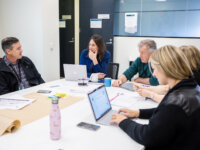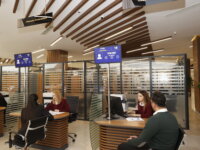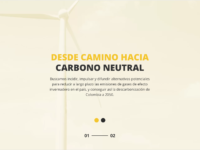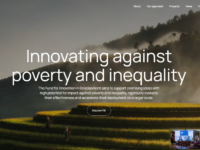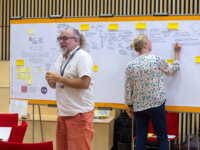The Small Business Development Corporation (SBDC) has embraced human-centred design to transform the way regulation is developed and applied for small businesses in Western Australia. The SBDC partnered with 22 local governments to deliver the Small Business Friendly Approvals Program, which involved reviewing the approvals journey from the small business’ perspective and designing reforms to streamline processes. The Program has ignited transformational change and made it easier to do…
Innovation Tag: Financing Mechanisms and Innovation Funds
SME Houses are one-stop-shop centers providing comprehensive services and support tools to SMSs during planning, starting, running and developing businesses. It is a unique initiative that allows mobilization and coordination of resources of all public and private stakeholders to contribute to development of SME sector. It makes it easier for those who often don’t know from where to get specific services to just go to one facility and get consultation, guidance, services and support.
The Sola calculation tool allows estimate the economic impact of 25 distinct social phenomena at municipal, regional and national level. Impact assessments at one, five and ten year intervals can lead decision-makers to better understand how to invest in wellbeing and accelerate impact investing. Results of the tool have been used in several municipalities as part of health and wellbeing promotion. A MOOC course has been developed and similar calculation tools are recently being used in other…
The City of Recife, like any city, faces the challenge of solving complex problems, however, there was difficulty in identifying them and finding effective solutions. The opportunity then arose to encourage open innovation in the city and involve the community in the development of solutions. Innovation lies in how to identify these problems, transform them into challenges and how to buy something new from a public body to solve these challenges. EITA Recife brings together the City Hall…
This initiative was created to accelerate the decarbonisation process of the energy and transport sectors in Colombia and work on the training and technicalization process for multiple sectors of society involved. A total process of decarbonisation of the energy and transport sectors cannot be possible if working in a single line. Carbon Neutral Pathway (Camino Hacía Carbono Neutral - CHCN) works with a broad range of stakeholders, including public officials, journalists, academics,…
The Innovation Fund for Development (Fonds d'Innovation pour le Développement) is a new and ambitious funding mechanism. It offers grants to innovators and researchers to experiment, take strategic risks and demonstrate the impact of solutions aimed at reducing poverty and inequality. It enables teams from all types of organisations to test new ideas and put innovation and research at the service of transforming public development policies.
The Local Wealth Building Challenge Fund is designed to provide financial and non-financial support to develop new products and services to tackle challenges. One aspect of this Challenge Fund which is unusual is the focus on developing innovations that will be procured by the challenge holder, providing additional incentives and focus. Public and third sector organizations often have issues that can be solved not by getting new skills or more workers, but by being innovative. The Challenge…
The Acolhe Programme offers private network accommodation for women in situations of violence in more than 230 municipalities in Brazil in partnership with municipal networks for confronting violence. In addition to offering reception, the programme acts on the municipality's referral flow by demanding a public response to the problem and offering qualification.
The innovation refers to a structured platform for cooperation between the Municipality of Amaroussion and the private sector for the public benefit. Corporate Social Responsibility resources are used to cover identified local needs in synergy with public interventions/services. Following a minor organisational reform, a team of officials has been trained to implement an innovative customised methodology that allows visibility and accountability and promotes the extroversion of public sector.
The rate of innovation often exceeds the speed at which regulatory systems can adapt, blurring lines between sectors and cutting across transitional regulatory and geographical boundaries. The RPF aims to keep the UK at the forefront of regulatory thinking and experimentation. It sponsors projects, led by regulators, aiming to help create a UK regulatory environment that encourages business innovation and investment. It is market-led and uses real-world innovation settings to deliver.

